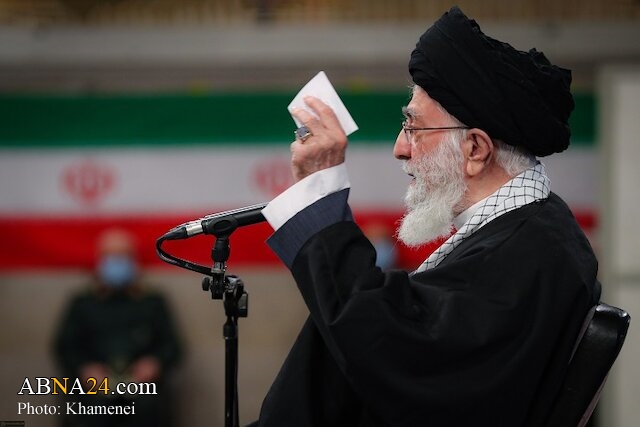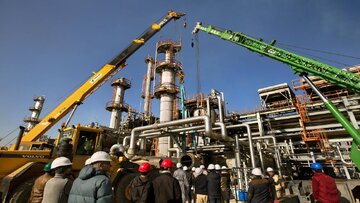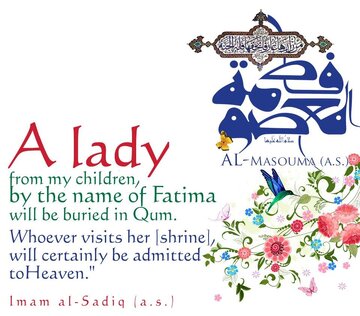AhlulBayt News Agency (ABNA): In his recent speech, Ayatollah Ali Khamenei stressed that only Iran has the right to set conditions for the JCPOA. The stance of the Leader of the Islamic Revolution lies in the US’s repeated and blatant violations of the JCPOA. The following Op-Ed investigates the history of US’s manipulative and dishonest approach in regard to Iran from even before the Revolution up to the present time.
In his speech when meeting with commanders from the Air Force and the Army Air Defense on February 12, 2021, Imam Khamenei, the Leader of the Islamic Revolution referred to the European and American officials’ comments on the JCPOA and sanctions. He emphasized:
The side which has the right to set conditions for the continuation of the JCPOA is Iran. The reason is that from the beginning, Iran honored all its commitments. The Islamic Republic honored all its JCPOA commitments, but they violated theirs. Therefore, we have the right to set terms for the continuation of the JCPOA… The condition is that if they want Iran to return to its JCPOA commitment… the US has to lift all sanctions. And not just in words and on paper, rather they have to lift them in practice. After that, we will verify and see if they have really been lifted. Then, we will return to our JCPOA commitments. This is the definite policy of the Islamic Republic and it has been approved by all the officials of the country. Therefore, we will not retreat from this policy.[1]
The question that comes to mind in this respect is why the Leader of the Iranian Revolution has taken such a stance toward America’s new government that is run by Democrats and which has supported returning to the JCPOA. Why is the Leader not ready to return to commitments under the JCPOA before complete removal of all US sanctions in action. The answer to this question lies in the history of relations between Iran and the US.
Since the 1940s and following US involvement in World War II, which led this country to quit its isolationist policies, the governments of both the Republicans and the Democrats have implemented a similar policy toward Iran. This policy has been based on their attempts to colonize Iran, prevent the Iranian people from achieving independence and freedom, oppose the formation of a democratic, religious government during the Pahlavi regime and attempts to weaken and topple the Islamic Republic after the victory of the Islamic Revolution led by Imam Khomeini (r).[2]
This policy was pursued during the Pahlavi regime in the following ways:
Widespread presence of American military advisors in Iran: Following the agreement between Iran and America on November 4, 1943, the number of American advisory boards present in Iran increased. These advisory boards worked in the fields of financial, military, health, agriculture and oil, and they gradually enjoyed exemption from taxes and the privilege of capitulation. The presence of American advisory boards in Iran led to the increased economic and political influence of America in Iran to such an extent that trade between Iran and the US accounted for more than 25% of Iran’s foreign trade in 1945. In this way, America targeted Iran’s economic, political and cultural security using the scheme of sending advisors to Iran. This trend leading a high level of dependence was reinforced in the 1960s and 1970s through the widespread purchase of American weapons, food, luxury goods, vulgar movies, etc.[3]
Attempts to destabilize Iran via sectarianism: Another of America’s goals was to weaken the Shi’a religion in Iran. They knew that the Shi’a religion and its Islamic foundations led by Islamic scholars was a great obstacle to America. Therefore, they tried to weaken its foundations using various measures. From the time of Fath-Ali Shah, Americans sent missionaries to Iran to preach Protestant Christianity. This continued throughout the Qajar dynasty and during the Pahlavi period by establishing colleges and cultural centers dependent on the American embassy and consulate in Iran.[4] Interestingly, in an essay published in 2015, the Wall Street Journal proposed some strategies for changing the Iranian regime. One of these strategies was to make the Iranian people Christian because they believed that the growth of Protestant Christianity in Iran had not been worked on very much. In this essay, it was asserted that it can be expected that Christian officials will be able to find their way into Iranian political and security systems within a decade and support the rights of Iranian Christians.[5]
Opposition to nationalization of the Iranian Oil Industry by way of staging the 28th of Mordad coup d'état: Nationalization of the Iranian Oil Industry in 1951 led to its oil revenues - the most important source of revenue for the country – becoming accessible to Iranians. After this took place, the American and British governments conspired to arrange and carry out a coup d’état against the Iranian government in 1953. Following the coup d’état, America increased its interference in Iran’s affairs to such an extent that by 1979 AD (1357 AHS), America played a leading role in the development of the Pahlavi regime’s policies.[6]
Plundering Iran’s oil revenues until 1979: Starting from 1953 and up until 1979, the exploration, extraction and sale of Iran’s oil was under the control of a consortium of seven companies, five of which were American. They continued to plunder Iran’s oil resources up until the time of the victory of the Islamic Revolution in Iran.[7]
Some of the measures taken by America for colonizing and dominating Iran and preventing its independence and freedom, included: the formation of SAVAK (Organization of National Security and Information), suppressing and torturing freedom-seekers in Iran, carrying out espionage against the Eastern Bloc countries,[8] approving the capitulation law to prevent American citizens from having to stand trial in Iran after committing crimes and violations,[9] implementation of economic reforms or the so-called White Revolution with the purpose of destroying local agriculture, making Iran dependent on the imports of food products from America and destroying Iran’s food security, and refusing to transfer advanced technology to Iran in order to make it dependent on assembling inferior Western products.[10]
America’s continued animosity and lack of commitment to Iran after the Islamic Revolution
Violation of America’s commitments in the Algiers Accords: After the victory of the Islamic Revolution in Iran, despite all the military, intelligence, economic and political support provided by the Democrat government of Jimmy Carter for the Shah of Iran, America’s embassy in Iran turned into a center of espionage against Iran. It was a center for coordinating activities aimed at destabilizing the country, particularly in central provinces in an attempt to weaken Iran. On the other hand, Shah took refuge in America and the probability of planning a coup d’état by the American government with the cooperation of Shah was discussed over different media. In reaction to these changes, a number of university students who supported the Islamic Revolution took over the American embassy in Iran and took its employees hostage.[11] The documents found in this embassy showed that the previous suppositions about the fact that the American embassy had turned into a center for espionage and subversion[12] against the Islamic Republic were true.[13] In response, America launched a military attack against Iran in April 1980. This attack was doomed to failure following a sand storm in the Tabas Desert. A number of their military forces were killed, and their equipment and helicopters were captured by Iran.[14]
America also supported the Nojeh coup d’état, which was a plan to overthrow the Islamic Republic in July 1980,[15] and they supported Iraq’s military attack on Iran in September 1980.[16] Eventually, American hostages were set free after 444 days through the mediation of Algeria and following negotiations between Iran and America. Iran fulfilled all its commitments and set the hostages free immediately, but America violated all its commitments. These commitments included not interfering either directly or indirectly in Iran’s affairs, removing trade sanctions, release of Iranian assets in America that were frozen by the US president of the time after the American embassy staff were taken hostage, and the cancellation of all debts and claims of the governments, companies and US citizens against Iran. However, America refused to cooperate with Iran in returning the assets of the Shah and his relatives to Iran under the pretext of not knowing the amount of the assets held by the former Shah and his relatives.[17]
Wide range of trade sanctions against Iran: Different American governments have imposed various sanctions on Iran since the 1980s. Reagan’s government prohibited importing Iranian goods to America and selling high tech products to Iran, and it tried to make these sanctions international.[18] Clinton’s government imposed heavy sanctions since the mid-1990s, prohibiting the purchase of Iran’s oil and any commercial or monetary transactions with Iran. They also prohibited credit transfer, currency exchange and the transfer of Iranian assets, while punishing American companies or companies with American shares for investing more than 40 million dollars in Iran’s oil and gas industry. They also imposed a ban on exporting goods and technology to Iran that would help in strengthening its oil and gas industries. In subsequent years, Clinton’s government, the Congress and the Senate extended the sanctions and bans to commercial activities as well.[19]
Starting a soft war against the Islamic Republic of Iran: Since the late 1990s with the advent of the internet and satellite TV, the American government launched numerous radio and TV channels and websites in the Persian language in an attempt to wage a media campaign against the Islamic Republic and destroy its reputation. Their activities focused on trying to show that Islam is in conflict with freedom, development and democracy, reinforcing secularism, suggesting conflict exists between scientific development and religion and morality, denying the achievements of the Islamic Republic, undermining the national security and foundations of unity in the country, disrupting the system’s integrity and implanting the idea that disagreement and divisions exist in the administration of the country. During the last two decades, their propaganda wars on Iran have centered on trying to show that Iran violates human rights, supports terrorism and is attempting to build nuclear weapons and weapons of mass destruction. It should be noted that this media has always remained silent about the actions of the real supporters of terrorism, their violation of human rights and the weapons of mass destruction of the Zionist regime, Saudi Arabia and their likes.
Violation of the Treaty of Saadabad: In October 2003, the Foreign Ministers of three European countries including England, France and Germany entered Tehran to present America’s demands to Iran and ask them to stop nuclear enrichment and completely suspend Iran’s nuclear activities. Iran eventually accepted these requests on a voluntary basis for a short period of time for the purpose of building trust and in exchange for receiving certain economic benefits and incentives from the western countries. Iran also agreed to implement the Additional Protocol to the NPT. But in contradiction with the commitments made by the three western countries, no economic benefits were given to Iran, while a large part of the Islamic Republic’s nuclear industry was unilaterally suspended.[20] As a result, with the change of government in Iran, suspension of uranium enrichment was reversed, opening the route to continued development of the Islamic Republic’s peaceful nuclear activities. In response, Barack Obama’s Democrat government, along with the European Union, imposed new, severe economic and financial sanctions on Iran. They also imposed an unprecedented sanction on the Central Bank of the Islamic Republic of Iran. Three resolutions were passed against the Islamic Republic under pressure from the US and its European allies in the Security Council of the United Nations.[21]
Violation of the JCPOA: Finally in October 2015, the JCPOA agreement (Joint Comprehensive Plan of Action) on Iran’s nuclear program was signed after several years of negotiations between Iran, China, Russia, France, Germany, England and America. Based on this agreement, Iran was committed to dispose of a large portion of its enriched uranium reserves, reduce the number of its centrifuges by two thirds for 15 years, stop uranium enrichment beyond 3.67 and to not build a new enrichment facility or heavy-water reactor. Since that time, inspectors from the International Atomic Energy Agency have been continuously examining and supervising the execution of the provisions of the JCPOA and have had regular access to all Iranian nuclear facilities.
From the other side, the sanctions imposed by the UN Security Council, the European Union and America were to be removed and economic incentives were to be offered to Iran.[22] However, violation of the JCPOA began from the very first day by the Democrat government in America led by Obama and peaked during the Republican government led by Trump resulting in America’s withdrawal from the nuclear deal and the imposition of more severe sanctions on Iran. Some of their violations of the JCPOA included: extension of the Iran Sanctions Act (known as ISA) by the US Congress,[23] creating travel limitations for the citizens of the countries participating in the Visa Waiver Program who wished to travel to the United States if they travelled to Iran, America’s continued soft war and mass media war on Iran, creating a negative atmosphere against the Islamic Republic in the UN Security Council, not effectively removing the sanctions imposed on Iran’s nuclear industry, America’s opposition to other countries’ normalization of trade ties with Iran by directly and indirectly threatening to reduce its economic and commercial cooperation with them, preventing the issue of sales licenses for selling airliners or renting airliners to Iran, and imposing cumbersome regulations to prevent Iranian Central Bank’s access to its financial resources abroad.[24] Trump’s government imposed numerous sanctions against Iran to the extent that he banned medicines, vaccines and medical equipment being sent to Iran, even under the adverse conditions that had come about due to the Coronavirus pandemic.
Conclusion
The different governments in the United States, with whatever political party orientation they had, have spared no attempts to undermine the independence and freedom of Iran and to violate its sovereignty over the last 80 years. The goal of these measures has been to unilaterally serve the interests of the United States by turning Iran into a weak country that is dependent on the US for them to be able to plunder Iranian resources and assets. For this reason, America has unilaterally violated all its commitments and obligations in all the agreements it has signed with Iran and has left behind a record of its greed and perfidiousness. Based on what has been said here, the logic behind the Leader of the Islamic Republic of Iran’s statement, “The side with the right to set conditions for the continuation of the JCPOA is Iran,” becomes clear.
-----------------------
[1] https://english.khamenei.ir/news/8363/If-they-want-Iran-to-resume-its-JCPOA-commitments-the-US-has
[2] Brumberg, Daniel, Reinventing Khomeini: The Struggle for Reform in Iran, University of Chicago Press, 2001
[3] Kashani-Sabet, Firoozeh, American Crosses, Persian Crescents: Religion and the Diplomacy of US-Iranian Relations, 1834–1911, Iranian Studies Journal, Vol. 44, No. 5, (SEPTEMBER 2011), pp. 607-625
[4] https://www.wsj.com/articles/a-road-map-to-regime-change-in-tehran-1443119158
[5] https://www.npr.org/2019/01/31/690363402/how-the-cia-overthrew-irans-democracy-in-four-days
[6] https://www.iranicaonline.org/articles/oil-agreements-in-iran
[7] https://www.refworld.org/docid/3ae6aaa724.html
[8] http://www.iranreview.org/content/Documents/Capitulation-in-Iran.htm
[9] M.Ansari, Ali, The Myth of the White Revolution: Mohammad Reza Shah, 'Modernization' and the Consolidation of Power, Middle Eastern Studies, Vol. 37, No. 3 (Jul., 2001), pp. 1-24
[10] https://www.bostonglobe.com/opinion/2014/11/04/thirty-five-years-after-iranian-hostage-crisis-aftershocks-remain/VIEKSajEUvSmDQICGF8R7K/story.html
[11] https://www.nytimes.com/1986/07/10/world/7-years-after-embassy-seizure-iran-still-prints-us-secrets.html
[12] https://archive.org/details/DocumentsFromTheU.s.EspionageDen/v01_front_H.jpg
[13] https://navideshahed.com/en/news/17030/the-failure-of-american-eagle-claw-operation-in-tabas-iran
[14] Mark J. Gasiorowski (2002), The Nuzhih Plot and Iranian Politics, Int. J. Middle East Stud. 34 (2002), pp.645–666
[15] https://archive.globalpolicy.org/iraq-conflict-the-historical-background-/us-and-british-support-for-huss-regime.html
[16] https://www.foreignpolicyjournal.com/2018/01/19/the-algiers-accords-decades-of-violations-and-silence/
[17] https://www.nytimes.com/1987/10/27/world/reagan-bans-all-iran-imports-and-curbs-exports.html
[18] https://www.nytimes.com/1995/05/01/world/clinton-to-order-a-trade-embargo-against-teheran.html
[19] https://www.theguardian.com/world/2003/oct/22/iran.politics1
[20] Congressional Research service, Iran Sanctions, Updated 18 November 2020, in https://fas.org/sgp/crs/mideast/RS20871.pdf
[21] https://2009-2017.state.gov/e/eb/tfs/spi/iran/jcpoa//index.htm
[22] https://www.reuters.com/article/us-iran-nuclear-usa-sanctions-idUSKBN13Q5JW
[23] Congressional Research service, Iran Sanctions, Updated 18 November 2020, in https://fas.org/sgp/crs/mideast/RS20871.pdf
[24] https://www.aljazeera.com/opinions/2020/5/8/sanctions-make-irans-coronavirus-crisis-more-deadly
/129
22 February 2021 - 06:53
News ID: 1117648

The following Op-Ed investigates the history of US’s manipulative and dishonest approach in regard to Iran from even before the Revolution up to the present time.




